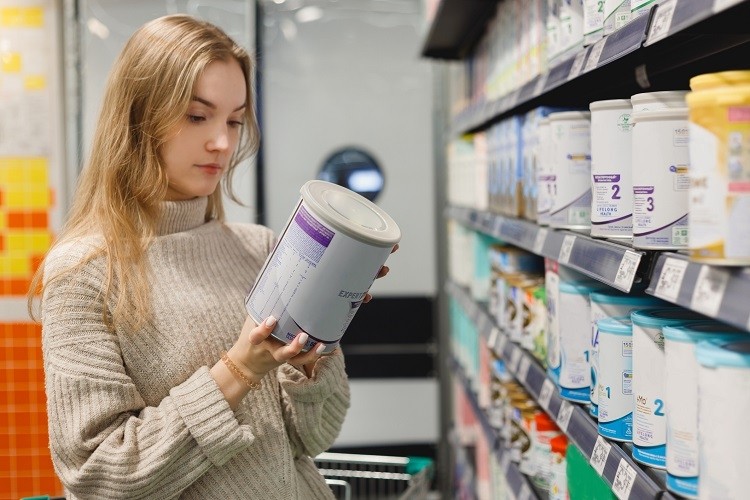In adult nutrition, plant-based is booming. According to EU-funded research, Europe’s plant-based food industry grew 49% between 2018 and 2020, achieving a total sales value of €3.6bn. Meticulous Research estimates that Europe’s plant-based food market will grow at a CAGR of 10.1% from 2022 through to 2029, to reach $16.7bn by 2029.
In infant nutrition, however, plant-based is scarce. The baby formula market is dominated by bovine milk, with just a small percentage based on plant-based ingredients.
Why is this? Could there be potential for plant-based to take a greater share of the infant formula market? And what products currently exist for parents considering dairy alternatives? FoodNavigator investigates.
Is stringent regulation impeding plant-based innovation?
Regulation is at least part of the reason the plant-based segment of the baby formula category is so limited. In Europe, for example, just one plant-based protein is approved for sale in the infant formula market: soy.
“The infant nutrition category is one of the most strictly regulated product areas, and it’s understandable why that would be,” explained Jessica Burt, a specialist lawyer in food regulatory, marketing, and product liability at UK law firm Mills & Reeve.
“Infants are the most vulnerable sector of society…because of their development stage, but also because of their weight, and the restriction of variety within their diet means they will be most adversely affected by any contaminants in their food,” she told FoodNavigator.
While stringent regulations, therefore, appear necessary, they can also impede innovation. While on the one hand, regulation is helpful to researchers, providing a framework within which to work, it could also demotivate, suggested Burt. “If the entirety of plant-based products is excluded from infant formula and food, then there isn’t the incentive for research to go into [any relevant] safety issues could be avoided.”
With the UK having withdrawn from the European Union, however, is there now greater opportunity for innovation within the baby nutrition category? Will the UK stick by the EU’s regulatory approval of one sole plant-based protein?
After Brexit, there is the opportunity for the UK to diverge away from Europe, agreed Burt. “After Brexit, all the EU legislation was immediately implemented within UK law by the EU Withdrawal Act 2018. However, we are seeing divergence now in specific instances.”
Genetic engineering and modification is one area the UK is investigating since leaving the EU. “We’re seeing the Genetic Technology (Precision Breeding) Bill coming through the House of Lords currently, so it is possible, on individual bases to diverge from Europe…there are changes afoot and there is more focus on research and innovation…particularly in the ag-tech area.
“I’m not so sure whether infant formula will be a priority, however it is certainly a possibility.”
Finding a middle ground between dairy and plants
Baby nutrition brand Aptamil, owned by Danone, is well aware of the EU’s stringent regulations in this product category. “It’s a very highly regulated market,” explained Manuela Borella, VP of Global Plant Based Business Strategy & Acceleration at Danone.
The European Food Safety Authority (EFSA) stipulates that only one source of plant-based protein, soy, is allowed for infants aged 0-12 months. “Soy is clearly the highest quality of plant-based proteins,” Borella told this publication. “It is the most complete and has the closest resemblance to dairy ingredients.”
Danone is leveraging soy, alongside dairy, to expand the baby formula category in Europe. In finding this middle ground, the company claimed an ‘industry first’ earlier this year when it launched a new baby formula blending both ingredients under its Nutrilon brand in the Netherlands.
“This innovation is part of a novel programme…We recognise that new parenthood can be challenging and that babies can have different feeding journeys,” Borella explained. “With the Aptamil portfolio, we want to make sure that new parents feel supported whatever their feeding style, their feeding choices, or family situation.”
Indeed, Danone has observed an uptick in plant-based consumption. “If you consider that seven in 10 parents prefer that their children eat more plant-based foods, or that one in four households are already introducing plant-based foods to their toddlers, it’s clear that…those parents deserve to have a feeding choice that meets those preferences.”
Danone is catering to such preferences with its Dairy & Plants Blend baby formula, within which 60% protein comes from soy, and 40% comes from dairy.
“Blending dairy and plant ingredients is our response to make sure parents who have chosen to be flexitarian, vegan or vegetarian can feed their babies what they think is best, without any nutritional compromise.”
Aside from soy and dairy, Danone has also introduced omega-3 DHA into the formulation, which is ‘critical for brain function and development’, from sustainably sourced algae. Fats are introduced from vegetable oils.
If so many nutrients can be sourced from plants, why include 40% dairy-based proteins? “We think it’s important…to bring balance between dairy and plants, and slowly and smoothly introduce more plants into babies’ diets,” explained Borella.
Lactose is another important ingredient Danone didn’t want to do without. “Lactose is a key ingredient in breastmilk, so of course we wanted to keep it in the formula.”
But even by including lactose, as well as casein and whey – which is all found in human milk – Danone knows industry will not be able mimic the real thing. “Breastmilk is clearly the golden standard in infant nutrition…and is our constant inspiration. We have been researching breastmilk for 50 years now. But let’s be clear, we – Danone, nor anyone else – will never be able to completely mimic breastmilk, because breastmilk is what nature does best.”
Beyond soy: rice and pea protein baby formula
Selasi Berdie, co-founder of Australia-based childhood nutrition company Sprout Organic, agrees. “Nothing can ever replicate human milk. Even as our technology increases and we get better at producing a product, it’s just not something that can be done.”
Instead, Sprout Organic is working to meet the nutritional requirements for children with a plant-based formula he believes stacks up against the dairy-based infant formulas on the market. In fact, Berdie believes Sprout Organic’s products are of a higher quality than most dairy-based formulas on the market. “We can say, head on heart, that we’re producing it from natural sources, we don’t have added sugars or added intolerances that may be found in bovine formula.
“I would say that 90% of [dairy-based formulas] don’t go down the organic or ‘clean’ route. We don’t have the fillers, we don’t have the common unwanted ingredients…I often think it’s what we don’t have in our products that makes it special.”
Now that we know what ingredients Sprout Organic isn’t using in its baby formula, we asked Berdie which plant-based ingredients do make their way into the final product. The predominant ingredient, he explained, is rice. “Rice is the most well tolerated ingredient…We have no common allergens [in our product], be it dairy, soy, wheat, gluten or nuts. Rice is free of all of those.”
Protein is sourced from a blend of rice and pea, which goes through a multi-stage fermentation process to boost its bioavailability and enable easier digestion. Sprout Organic then adds vitamins, minerals and fats.
Unlike EU-based plant-based baby formula brands, Sprout Organic is steering clear of soy. “If you have a dairy intolerance, there is a 50% likelihood that you have a soy intolerance,” the co-founder explained. “So for us, it was better to avoid soy.”
Of course, Sprout Organic can only avoid soy because of the variances between Australia and the EU’s regulatory environments. In Australia, both rice and pea proteins are approved by the Food Standards Code, as they are in ‘multiple’ parts of Asia. “It is actually fine in all countries, it’s just it’s so new and innovative that the code hasn’t caught up to the technology.”
Berdie, himself, follows a plant-based diet. And in fact, it was when he became a ‘plant-based dad’ and he realised there were limited options for infants and kids, that he and his co-founder and wife Jenna set about developing an organic, plant-based formula.
So it has been surprising to learn that a majority of Sprout Organic’s customer base is not necessarily plant-based themselves. “I went into this thinking that a big part of our demographic would be…plant-based,” he told this publication.
Instead, he has found that most of the company’s customers choose Sprout Organic for its allergen-free profile. “We found a gap and realised that by making a very clean formula that doesn’t have any allergens, we were picking up on a massive part of the market.”
You can listen to interviews with Jessica Burt from Mills & Reeve, Manuela Borella from Danone, and Selasi Berdie from Sprout Organic on The FoodNavigator Podcast here, or wherever you access your podcasts.


